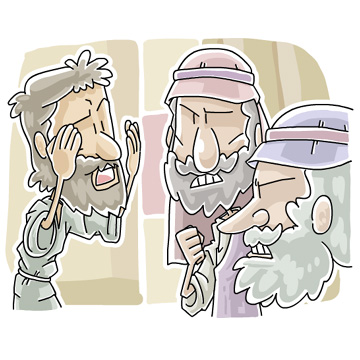that Riddle
We do things backward(s), you know, we can't help ourselves. Our creation cycle week and work goes First Day to Sabbath, Sunday to Saturday, and the church means for us to carry this out in practice: read the lessons for Sunday as the beginning of the week and read, teach, study, discuss them throughout the week. But we are too anticipative for that, we like to read and discuss Sunday's lessons as a climax, then starting Monday get on into the following Sunday's readings. At our Wednesday evening services, for example, we don't read last Sunday's gospel, we read and discuss the gospel for the upcoming Sunday. And it's okay, I did it as a parish leader in the church all my ordained life.
The alternative, to discuss the readings and sermon for last Sunday, might work for you lot, but probably not for us, as once we read, teach and preach it we don't dwell on what's done, our minds start contemplating what's coming up next because we need to think before we speak.
This morning I'm in a different direction, as my mind is still on the part of the Proper Gospel that I deliberately did not read in church last Sunday, that Riddle that Matthew has Jesus use to perplex his adversaries (MT 22:41-45 NRSV):
Now while the Pharisees were gathered together, Jesus asked them this question: “What do you think of the Messiah? Whose son is he?” They said to him, “The son of David.” He said to them, “How is it then that David by the Spirit calls him Lord, saying,
‘The Lord said to my Lord,
“Sit at my right hand, until I put your enemies under your feet”’?
If David thus calls him Lord, how can he be his son?” No one was able to give him an answer, nor from that day did anyone dare to ask him any more questions.
I left it out of the gospel reading because it's distracting and has nothing whatsoever to do with the first part, Jesus giving us the Summary of the Law, Love God Love Neighbor that, combined with the Collect, I was going to preach on.
But, see, the Riddle is still working on me. IDK, I think that in that first century sitz im leben, many Jews who, like Matthew, were rooting through the Septuagint (Greek language) Hebrew bible searching for verses that could be taken as messianic prophecy, and lifting those verses out of context to answer their questions, may have taken Psalm 110:1 as such a sign. And it can lead to further puzzlement, including whether the messiah would be simply a resumption of the earthly throne of David, or would be the apocalyptic coming of the Son of Man in Daniel 7. Unless you read the Hebrew נְאֻם יְהוָה, לַאדֹנִי if you just HEAR it read, Psalm 110:1 can catch you off guard, bring you up short, be confounding, confusing. I mean, hearing "the Adonai said to my Adonai" or "the Kyrie said to my Kyrie" or "the Lord said to my Lord", your eyebrows go up, Say What? You have to look at the Hebrew to see the psalmist's original meaning, and if you're chasing around searching for verses that might be messianic prophecy, you're not thinking that way; the to-this-day absurdly frantic misuse of Isaiah 7:14 to warrant the Doctrine of the Virgin Birth is the perfect example. I'm not going to revive our Sunday School lesson for day before yesterday except to affirm that bible thumping Psalm 110:1 out of context does indeed create the opportunity for a confounding riddle. Which brings me to the bus stop where I get off:
In the BCP, our Collects for the Day throughout the church year may be our most egregious example of holding on to prayers from the Dark Ages just because Scripture, Tradition, and Reason is one of our slogans in the lightbulb church: don't change it, it's lovely and, most importantly, this is the way we've always done it. We have, from the Church of England, now available through Church Publishing with the imprimatur of the Episcopal Church shield, a little book "Prayers for an Inclusive Church". It has new and reasonable Collects in the place of every Collect in the BCP. The Collect for Proper 25, last Sunday, would have been perfect. Listen:
Lord of the teasing riddle,
whose questions undo our certainty
and set us on a different path:
give us a heart of passion,
a searching mind,
gentle strength of body
and unseen depths of soul,
that we might love you wholly
and our neighbor as ourself;
through Jesus Christ the law of grace.
Amen.
+++++++++++
